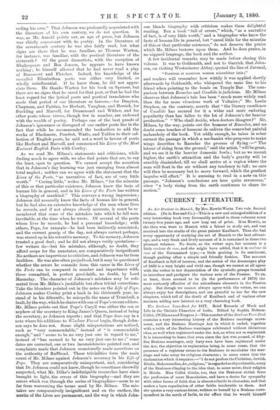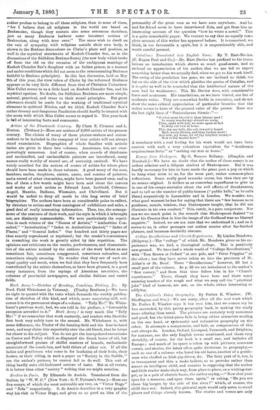The Brahmo Year-Book for 1877. Brief Records of Work and
Life in the Theistic Churches of India. Edited by Sophia Dobson- Collet. (Williams and Norgate.)—This number of the Brahmo Year-Book contains a very interesting history of the Brahmo marriage move- ment, and the Brahmo Marriage Act in which it ended, together with a table of the Brahmo marriages celebrated without idolatrous rites, as well when registered under the Act, as when not so registered. It is interesting to learn that even since the Act was passed, of fifty- five Brahmo marriages, only forty-two have been registered under the Act, the objection to registration being, in some cases, that the presence of a registrar seems to the Brahmos to secularise the mar- riage and take away its religious character ; in some cases that the declaration which it requires :—" I do not profess the Christian, Jewish, Hindu, Mohommedan, religions," is regarded as objectionable, many of the Brahmos clinging to the idea that, in some sense, their religion is Hindu. Miss Collet thinks, too, that the Brahmos shrink from the profession of mere Monotheism, and have a desire for sympathy with other forms of faith that is almost eclectic in character, and that makes a bare repudiation of other faiths intolerable to them. And she quotes a very curious letter, written to herself by a Brahmo corre- spondent in the north of India, to the effect that he would. himself
rather profess to belong to all these religions, than to none of them, "for I believe that all religions in the world are based on Brahmoism, though they contain also some erroneous doctrines, just as many Brahmos harbour some incorrect notions of Brahmoism, along with true ones." The same wish to dwell on the vein of sympathy with religions outside their own body, is shown in the Brahmo discussions on Christ's place and position, as well in the mystical statements of Keshub Chunder Ben, as in the discussions of the Sidharan Brahmo Somaj (the new body which broke off from the old on the occasion of the ambiguous marriage of Keshub Chunder Sen's daughter with an Indian prince, in a manner and under conditions which did not seem to the remonstrating Brahmos faithful to Brehm° principles). In this last discussion, held on May 9th of this year, the view taken of Christ by the reformed Brahmos appears to be very little different from that of Christian Unitarians. Miss Collet seems to us a little hard on Keshub Chunder Ben, and his mystical egotism. No doubt, the Sadhilran Brahmos are more simple, natural, practical, and truer to their moral principles. But great allowance should be made for the working of traditional mystical elements in spiritual Hindus, and we think Keshub Chunder Sen's rather dreamy and dangerous Pantheism should hardly be treated with the scorn with which Miss Collet seems to regard it. This year-book is fall of interesting facts and comments.











































 Previous page
Previous page